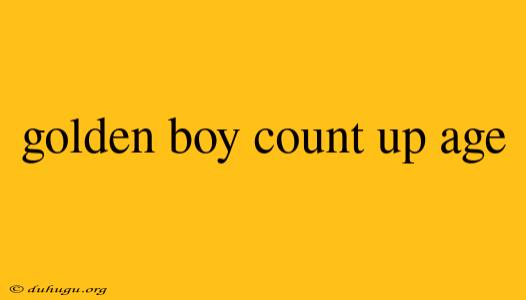Golden Boy Count Up Age: Unraveling the Mysterious Clock
What is Golden Boy Count Up Age?
Golden Boy Count Up Age is a popular Japanese manga series written and illustrated by Hirohiko Araki. The series is a spin-off of Araki's other successful work, JoJo's Bizarre Adventure. It was initially published in 2014 and has since gained a significant following worldwide.
The Story Behind the Clock
The story of Golden Boy Count Up Age revolves around the concept of a mysterious clock that appears in the lives of several individuals. This clock, known as the "Golden Boy Count Up Age," has the power to grant wishes to those who possess it. However, there's a catch - every time a wish is made, the clock's hand moves forward, counting up the user's age.
Characters and their Wishes
The series features a diverse cast of characters, each with their own unique storylines and motivations. There's Takumi, a young office worker who wishes to become rich and powerful; Erika, a high school student who wants to become the most popular girl in school; and Ryotaro, a struggling artist who seeks inspiration and success.
As each character makes their wish, they are forced to confront the consequences of their desires. The clock's power comes with a steep price, and the characters soon realize that their wishes may not be as fulfilling as they initially thought.
Themes and Symbolism
Golden Boy Count Up Age explores various themes, including the nature of desire, the consequences of playing with fate, and the importance of self-awareness. The clock serves as a symbol of time and mortality, reminding the characters (and the readers) that our time on this earth is limited.
Conclusion
Golden Boy Count Up Age is a thought-provoking and captivating manga series that delves into the human psyche and the dangers of relying on external forces to fulfill our desires. With its unique blend of psychological drama and supernatural elements, it's no wonder that this series has resonated with fans worldwide.
As the clock continues to count up, the characters (and the readers) are left wondering: what's the true cost of our wishes, and is it worth the price?
